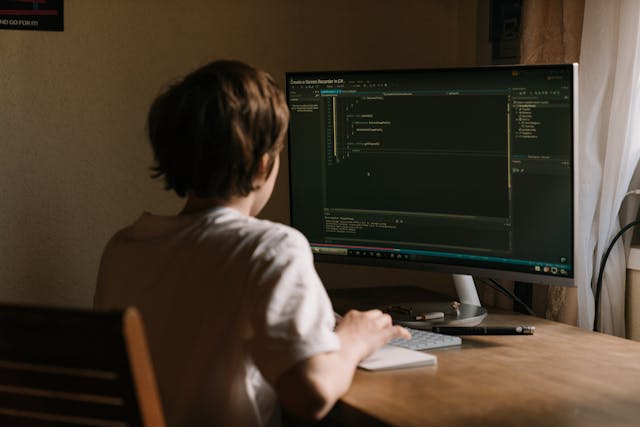Coding For Kids: Unlocking Creativity And Future Success
Teaching kids to code isn’t just a trend—it’s an essential skill. Coding for kids is like giving them a superpower that unlocks creativity, problem-solving abilities, and opportunities to thrive in the digital future.
Let’s explore the fascinating world of coding for kids.
What Is Coding?
Coding involves creating instructions that a computer can follow to perform tasks. These instructions are in programming languages like Scratch (a kid-friendly language), Python, or JavaScript. It’s like learning a new language but for communicating with machines.
For kids, coding often starts with fun, interactive platforms that teach the basics through games, puzzles, and animations.
Why Is Coding Important for Kids?
Here are the top reasons coding for kids are important nowadays:
1. Boosts problem-solving skills
At its core, coding is about solving problems. Whether it’s writing code for a robot to follow a path or debugging an error in a game, kids learn to approach challenges methodically. They break complex problems into smaller, manageable parts (a process called decomposition) and tackle them step by step.
These cognitive skills extend beyond coding. They help kids excel in academics and real-world situations.
2. Encourages creativity
Coding empowers kids to turn their imaginative ideas into reality. Whether they’re designing a virtual pet, creating an interactive story, or programming a robot, coding gives them the tools to build something uniquely their own.
By experimenting with different outcomes and approaches, your kids will learn that creativity isn’t limited to art or music—it thrives in technology, too.
For example:
- A child can code a game with their own characters and storyline.
- They can design animations to explain a concept in school.
This blend of logic and creativity fosters a growth mindset, encouraging kids to think outside the box.
3. Builds resilience and perseverance
Coding teaches kids that failure isn’t the end—it’s part of the journey. Debugging is an essential part of programming, requiring patience and persistence. When their code doesn’t work as expected, kids learn to experiment with solutions, iterate, and keep trying until they succeed. This resilience is a life skill that helps them face challenges with confidence.
4. Prepares for future careers
Technology is reshaping every industry, and coding is a skill that opens doors to countless career opportunities. From game design and app development to artificial intelligence and robotics, coding knowledge is highly sought after.
Even in non-tech roles, understanding coding concepts can give kids an edge. It helps them collaborate with tech teams and understand the digital tools they use.
5. Enhances academic performance
Coding involves computational thinking, pattern recognition, computer science, and problem-solving—all skills that directly improve math skills and analytical abilities. Kids who code often develop a stronger grasp of STEM concepts. These valuable skills lay the foundation for advanced fields like physics, engineering, and data science.
6. Develops communication and teamwork skills
Collaborative coding projects, whether in classrooms or coding camps, teach your kids to communicate their ideas clearly and work as part of a team. Kids learn to explain their code, listen to other’s perspectives, and incorporate feedback—all core soft skills in any profession.
Coding also introduces them to the concept of pair programming, where two people work together on the same project. It fosters a spirit of cooperation and shared problem-solving.
7. Encourages digital literacy
In a world where technology is integral to daily life, understanding how it works gives kids an advantage. Coding skills help them see beyond using apps and tools—it teaches them how these systems are built. This knowledge transforms them from passive consumers to active creators, empowering them to innovate and contribute meaningfully to the digital landscape.
8. Sparks lifelong learning
Coding isn’t just a skill; it’s a mindset of curiosity and continuous learning.
Technology evolves rapidly, and kids who learn to code develop a habit of staying updated and adapting to change. This mindset equips them to thrive in a dynamic, ever-changing world.
9. Builds confidence and independence
When kids successfully complete a coding project, it boosts their confidence. They realize they have the power to create and control technology, which is incredibly empowering.
Over time, as they tackle more complex projects, they develop independence and self-reliance, learning to solve problems and pursue their goals on their own.
How to Introduce Coding to Your Child
1) Start with age-appropriate platforms
- Ages 5-7: Platforms like ScratchJr are perfect for introducing young kids to coding concepts through games.
- Ages 8-12: Scratch, Tynker, and Minecraft Education Edition offer more advanced projects.
- Teens: Encourage them to explore Python, JavaScript, or C# for real-world applications.
2) Make it fun
Choose platforms with gamified learning experiences. Tools like Roblox Studio keep kids engaged while learning.
3) Encourage collaboration
Enrol them in coding camps or clubs where they can share ideas and learn together.
4) Integrate coding with other interests
If your child loves art, they can create digital drawings with coding. If they’re into music, they can compose tunes using platforms like Sonic Pi.
5) Set achievable goals
Start with small projects like building a simple game or creating a website. Celebrate their progress to keep them motivated.
How Parents Can Support Their Kids
- Be involved. Learn alongside your child. Platforms like Scratch make it easy for parents to participate.
- Provide encouragement. Celebrate milestones, no matter how small.
- Limit screen time wisely. Balance coding with other activities to avoid burnout.
- Invest in resources. Consider enrolling your child in online coding classes or workshops.
Final Thoughts
Coding for kids is about empowering them to think critically, dream big, and shape the future. Whether they create apps, design games, or simply learn to think like innovators, coding is a skill that will serve them for life.
After all, real-world scenarios require coding skills. An in-depth understanding of the coding language is a valuable investment in your child's future.
So why wait? Dive into the exciting world of coding with your child today.

